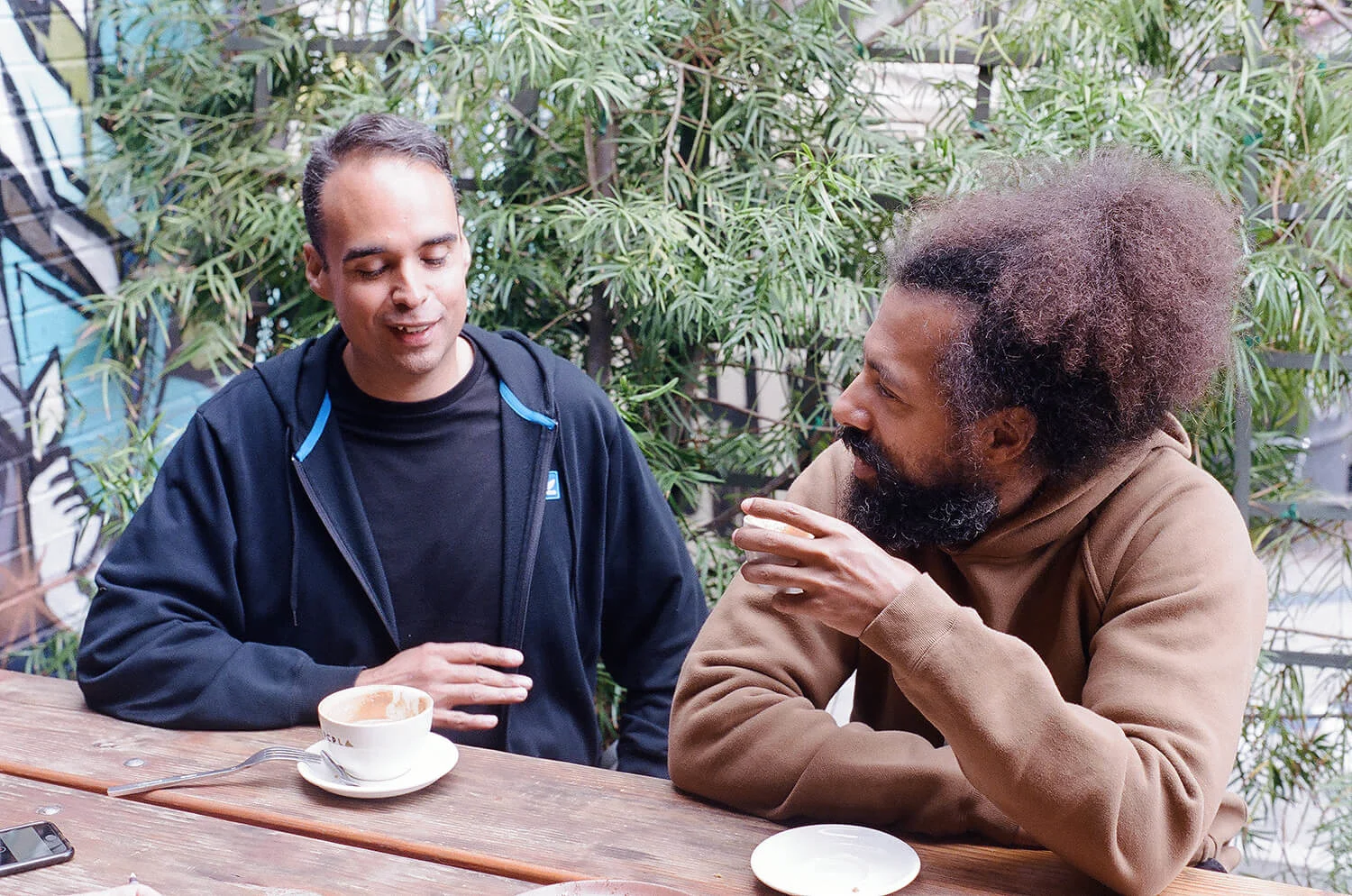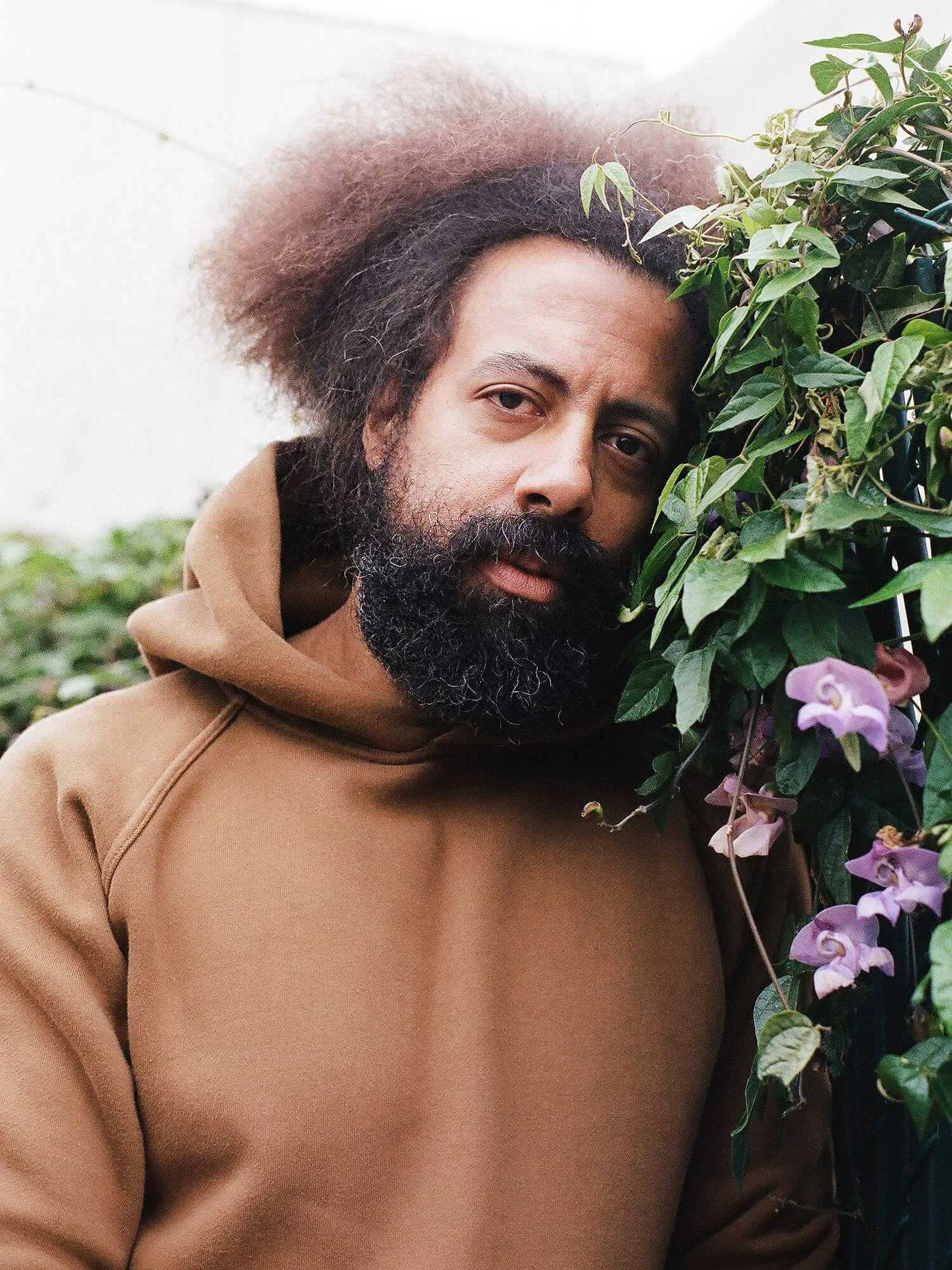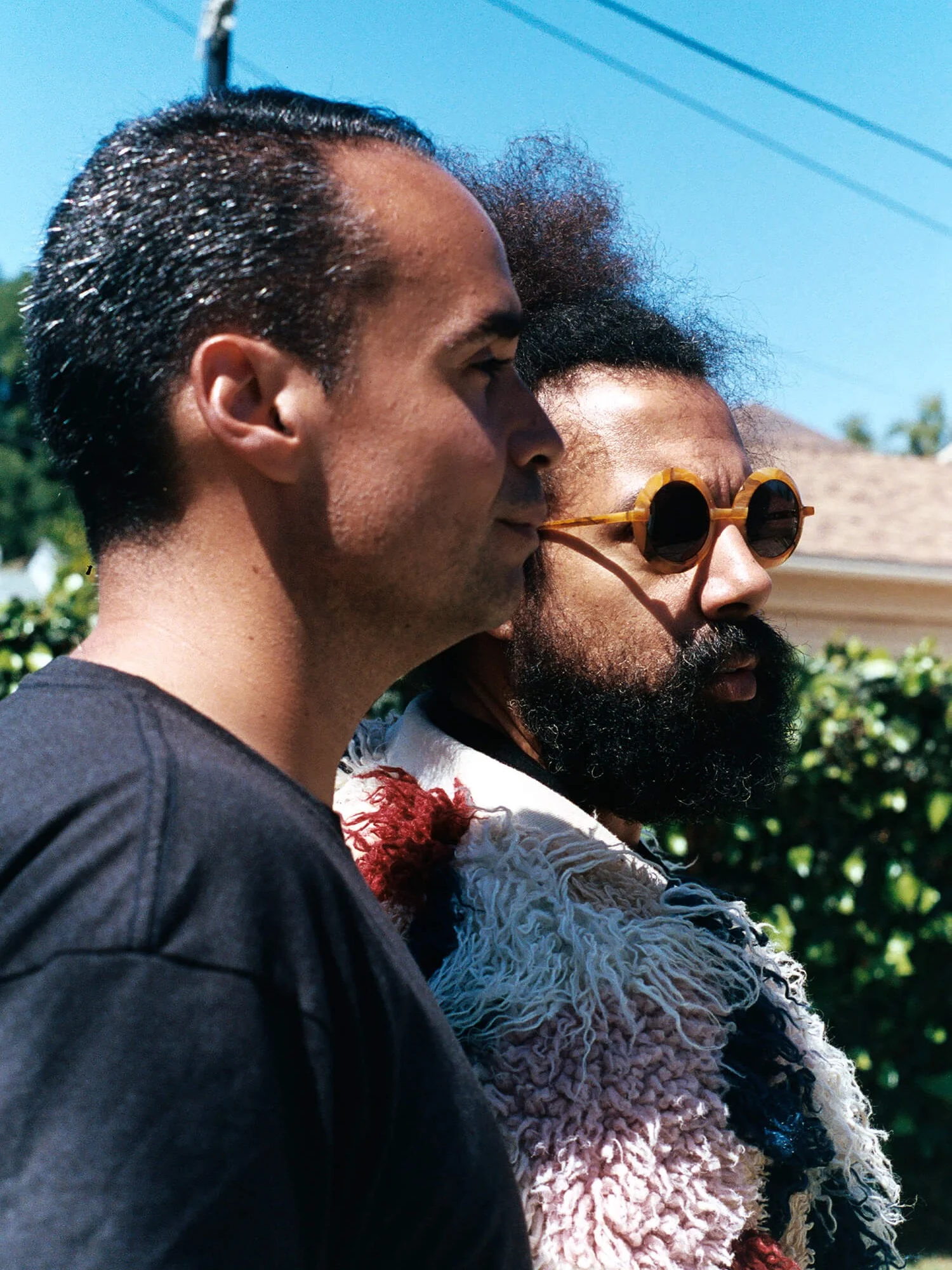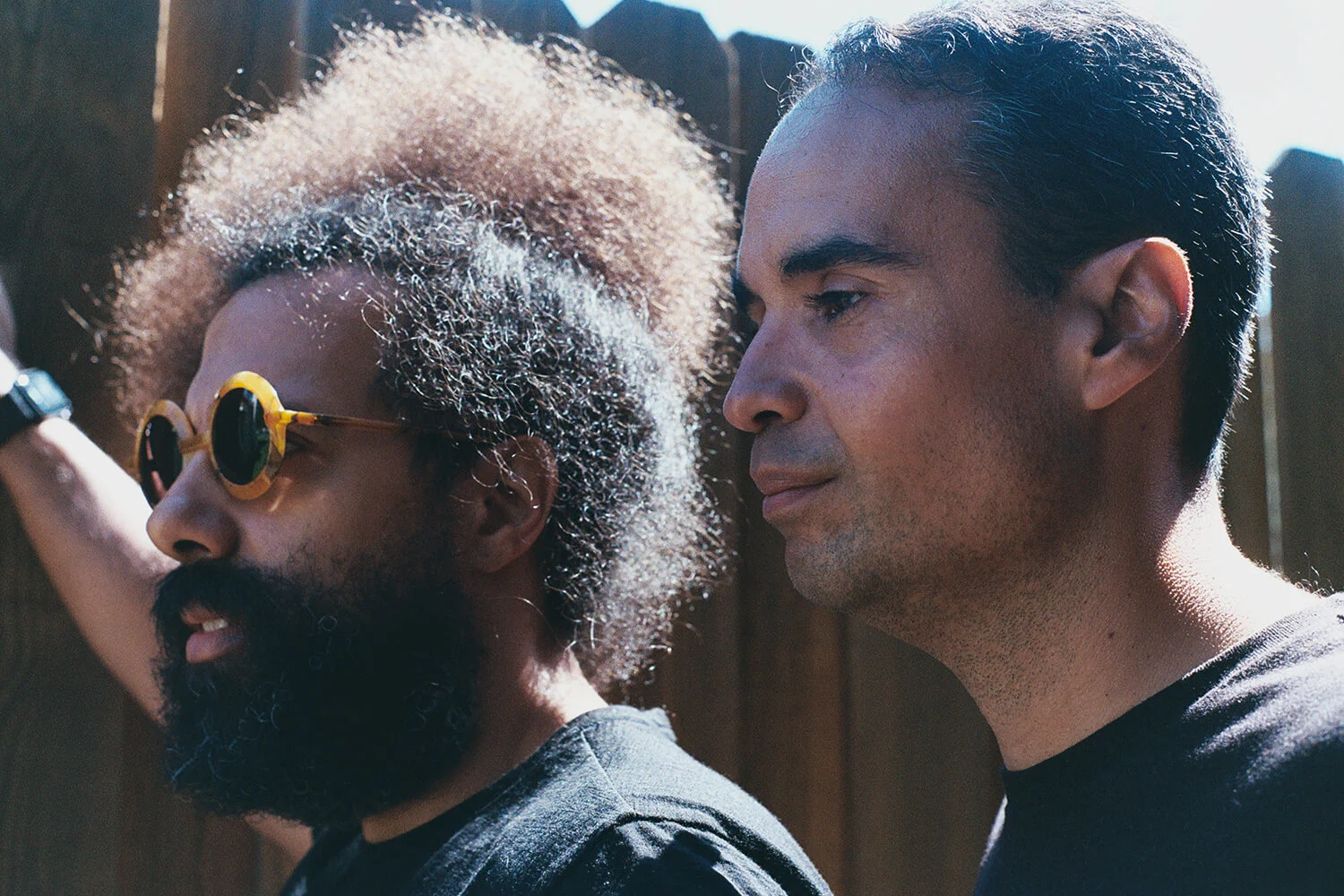

Some of the most interesting creative collaborations are also the most unlikely. Meet Wajatta – the coming-together of electronic composer John Tejada and poet, musician and stand-up comedian Reggie Watts. Andy Hermann sat down with them in Los Angeles to dig into how this surprising duo works so well. Photos by Maryam Khastoo.
John Tejada rises to greet the arrival of his friend and collaborator, Reggie Watts. “Do you remember?” he asks. “This is the spot of our first date.”
Reggie looks around. “Oh, right, that’s true,” he says, his ever-present smile widening.
They’re on the back patio of the Paramount Coffee Project in Los Angeles, a favorite hang of Reggie’s because it’s right down the street from CBS Studios, where five times a week he leads the house band on The Late Late Show with James Corden. After first meeting at one of John’s DJ gigs a little over a year ago, the two men reconvened here for a little coffee and conversation, bonding over shared passions — old-school hip-hop, 80s sci-fi flicks — and similar upbringings.

Long before they met, they were mutual fans: Reggie of John’s crisp, propulsive techno productions for labels like Kompakt and Poker Flat, John of Reggie’s surrealist comedy and improvisational vocal funk jams. Still, it took a while before John broached the subject of working together. “I didn’t want to force him into anything because I figure anyone who meets him is like, ‘Hey, do you wanna be in my thing?’ So we just hung out a bit.”
When they did finally begin working on the project they would eventually dub Wajatta — a portmanteau of their last names — their musical chemistry was immediate. Two of the tracks on their debut album, Casual High Technology, were recorded on their first day together in John’s home studio in Van Nuys, several miles north of Hollywood, where he lives on a quiet, tree-lined street that seems an unlikely source for his futuristic sounds.
“On Make Some Sense the first bit you hear was first-take Reggie,” John says, referring to the wordless scat singing that begins one of the album’s most classically four-on-the-floor tracks. “I work with a lot of people that are fast, but they need to hear it and write some lyrics and get the headphones and get used to it. Reggie it was just like, I hit record and five seconds in, it’s what you hear on the record.”
“Yeah, it was pretty instantaneous,” says Reggie. “What he played me was really fun and awesome and it sparked a lot of possibilities in my head.”
Reggie is famous for working improvisationally, using vocal loops to build tracks from the ground up and then freestyling on top of them with an expressive, multi-octave voice that startles people who know him only for his comedy. It’s a style that seems at odds with John’s precision-tuned techno — but John, it turns out, likes to work quickly, too, rejecting the popular notion that producing electronic music has to be a laborious process.
A lot of the percussion, even though it’s not super-obvious, it’s his mouth
“It shouldn’t be painful to have fun and make art,” he says. Once you’ve logged your 10,000 hours, you shouldn’t still be agonizing over getting the perfect kick drum sound. “This isn’t supposed to be a challenge. We both put 20-plus years into it. We should be able at this point to express ourselves without too much error.
“I agree with him 100%,” says Reggie. “I’m always looking for the fastest form of production. And it’s not about low quality — it’s about capturing the freshness. That’s the difficult thing. If you’re doing something long enough, what you’re expressing is not the thing you’re worried about. Like, I’m never worried about, urgh, will I have an idea?”

He says this matter-of-factly, not “tooting my own horn,” as he puts it. By his own estimate, he’s logged “about 15,000 hours of stage time,” most of it doing an entirely improvised mix of standup comedy and music constructed from vocal loops. “I’d say about nine or 10,000 of those hours — just into the ether. There’s no evidence of me having done it, no recording of it, nothing.” So when John asked him to collaborate, he was ready to tackle a project on which there would be a tangible, permanent record of his improvisations.
John, for his part, began producing techno in the mid-1990s and has become internationally renowned for a distinctively springy yet cerebral style, built almost entirely on analog synths. He’s never courted mainstream success by tailoring his sound to the trends of EDM, but his best-known tracks, including Sweat (on the Walls) and The End of It All, are the kind of underground classics that can fill any dance floor, from a dirty warehouse to a Vegas megaclub.
Both men are biracial and bicultural. Reggie was born in Germany in 1972 to a French mother and an African-American father serving in the US military; John came along a couple years later in Vienna, the son of an Austrian conductor and a Mexican-American opera singer. They both moved to the States at a young age; Reggie’s family settled in Montana, while John’s mother brought him back to Los Angeles’ San Fernando Valley, where he’s lived ever since.
“He was a little younger when he moved here, but some of that stuck in our heads,” John says of their similar backgrounds. Both men are hesitant to attribute too much of their creative identities to their upbringings, though Reggie does think it played a role in his ongoing fascination with language. “I love speaking in a way that sounds like a particular language,” he says. “When I toured Europe, I used to do fake Italian, fake Spanish, fake whatever.”
On Casual High Technology tracks like Je Wa Soto, Reggie strings nonsense syllables together in ways that sound like a lost African dialect, or possibly the patois of a particular Rio favela. “A lot of our improvisations, people say, oh, is that Brazilian? Portuguese? Which I kinda like, because that’s a beautiful, really sexy language.”
Their collaboration is an extension of their friendship. Everything is done together, in person — bouncing ideas back and forth in a studio, rather than over email. “You have to hang out,” says John. “You may have a bit of food, you have some beers, you make a tune.”
There’s an ease and warmth to the music on Casual High Technology that makes sense once you know their process — and once you see the two of them sitting together at the very same table where they had their first “date,” sharing a slice of coffee cake and setting up the punchlines to one another’s jokes.



You wouldn’t call Casual High Technology a comedy album, even though it was released on a label called Comedy Dynamics that’s best-known for stand-up albums from the likes of Bill Hicks and Patton Oswalt. But it’s filled with a playful back and forth, as Reggie’s vocalese loops ping-pong between the snaps and clicks of John’s drum machines. Often, as on the subtly insistent mid-tempo groove of Slippin’, the sounds bleed together until you can’t tell where the vocals end and the synths begin. “A lot of the percussion, even though it’s not super-obvious, it’s his mouth,” John reveals.
Their chemistry peaks on Runnin’, which achieves a kind of weightlessness in its lush blend of layered, soulful vocals, jazzy keys and high-BPM techno gallop. It’s the embodiment of their philosophy of working quickly and keeping it fresh — 20-plus years of experience distilled down into five minutes of dance music as graceful and seemingly effortless as a ballet dancer’s grand jeté.

“Things get ruined fast for us if it’s like, no, it’s not right, try it like this, try it like that,” says John. “Then it’s like, you know what? This song’s not gonna work.”
“Exactly,” Reggie says, laughing.
To perform live as Wajatta presents new challenges for them both. Reggie has to learn how to rein in his improvisations and recreate, at least in part, the melodies and phrases of the original album tracks. John has to learn to follow Reggie’s lead and embellish on the fly when inspiration strikes his partner, which it frequently does. “We’ve almost built these signals,” John says. “There’s certain things I do — like if I pull the beat out, he knows, here’s a change coming. And we just like … right?”
Reggie nods in agreement. “Eventually I hope John and I will have a portion of the show or moments in the show where we’re just kind of jamming together,” he says. “I’ll have a synth on stage and I’ll loop and he’ll be doing beats.”
At the time of our interview, they’ve done five live shows, including radio and TV appearances. In two nights, they’ll be doing a sixth, an album release concert at the Teragram Ballroom in downtown L.A. “I’m curious what we’ll be doing,” John says with a chuckle.
“I am, too!” says Reggie.

The show is a triumph. Once each track has achieved liftoff, propelled by John’s Roland TR-909 beats and Reggie’s vocal loops, Reggie steps to the front of the stage to work the crowd, unleashing his inner house diva with soulful shouts and a soaring falsetto. He’s clearly having a blast, bobbing his top-knot in time to the beat. Even the often stoic John moves to the sinewy rhythms, a shy half-smile etched across his face.
“This is a tune off our fourth album,” Reggie jokes at one point. “I hope you guys like it. It’s a song about love, loss and regeneration. Enjoy.” Then, unexpectedly and much to the audience’s delight, they launch into John’s biggest underground hit, Sweat (on the Walls), with Reggie paraphrasing the track’s original, spoken-word vocals in a deadpan, vaguely British accent: “Have you ever been a party where there was just sweat, dripping down? Dripping down from the walls?”
For the encore, they improvise. John builds a drum track on the 909, one element at a time. Reggie adds some vocal percussion effects, then loops the phrase “Get some.” John adds more synths. Reggie adds a keyboard part. He sings a falsetto lead, something that sounds like, “I know we should be able to know,” though it could also be the half-formed words of a made-up language. He looks back at John and they exchange grins.
It’s a moment no one will ever experience again. And like everything Wajatta does, it sounds effortless.

